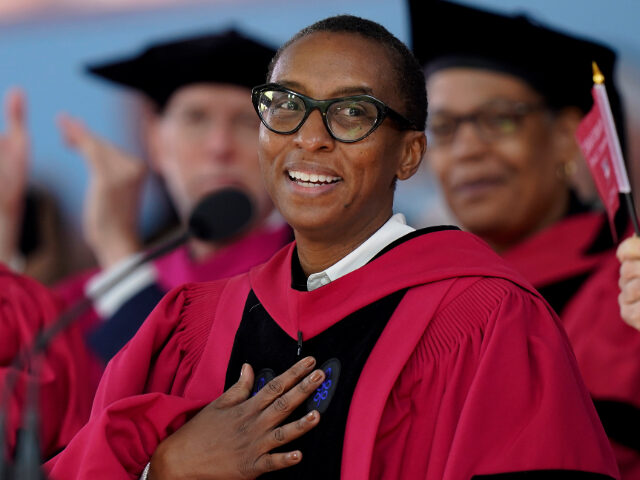The reliably left-wing Boston Globe is not satisfied with Harvard University’s decision to wave away mounds of evidence that its president, Claudine Gay, committed plagiarism in one scholarly work after another, and the paper is demanding an accounting on the grounds that the school is hurting American scholarship.
In a December 18 op-ed attributed to the Globe’s editorial board, the paper notes that Harvard seems to admit that Gay engaged in “inadequate citation” of her sources at the very least. However, the paper can not understand how the university can then go on and claim that Gay’s lax citations and verbatim lifting of passages do not violate “standards for research misconduct.”
Harvard’s desire to shield Gay led the paper to deliver a stark “Huh?” in reply to the head-turning proclamations of her innocence.
The Globe feels that the entire episode is a blot on Harvard’s reputation as well as a problem for all of academia. “The rest of American higher education looks to Harvard for guidance on academic norm,” the paper insisted, adding:
With that leadership role in mind, the university should clear away the uncertainty over how it has applied its plagiarism policies to president Claudine Gay’s past academic work and state clearly whether several of her papers ran afoul of the rules it expects students and professors to follow — or not.
The media have been full of examples of Gay’s papers containing verbatim copying of other people’s writing without citing sources and presented as if Gay herself wrote the entries — a classic example of plagiarism. The instances have been so numerous that the National Association of Scholars (NAS) called for Gay’s removal, citing her “shoddy professional work” and her “record of plagiarism.”
Despite the growing number of instances of blatant plagiarism, the governing body of Harvard University proudly stood up for its president and announced on December 12 that it “unanimously stand[s] in support of President Gay.”
But Harvard’s stiff-necked support for Gay is not satisfactory for the Boston Globe:
Last week the university’s governing board released a confusing statement that appeared to confirm a few instances of plagiarism — without using that word. It said a review by scholars had confirmed “instances of inadequate citation” in Gay’s work, but also that she did not violate “standards for research misconduct.” The statement also said she would be seeking corrections to add citations and quotation marks in two papers.
“The statement seems contradictory. If Gay didn’t violate any standards of research, why would she need to correct anything?” the paper asks.
The Globe goes on to note that Harvard seems to have set a standard that clearly makes Gay’s “inadequate citation” examples of plagiarism.
In Harvard’s own “What Constitutes Plagiarism?” notation on its website, plagiarism is defined in a way that should damn Gay’s work: “…it is considered plagiarism to draw any idea or any language from someone else without adequately crediting that source in your paper.”
Still, in another section of the website, Harvard makes room for a looser standard by noting that a finding of research misconduct requires said misconduct to be committed “intentionally, knowingly, or recklessly.”
For the Boston Globe, these contradictory policies are troublesome.
The Globe says it is not calling for Harvard to fire Gay, but it does think that the school is doing irreparable damage to academia:
But other people in the academic community have raised concern that, in its effort to defend Gay, the university is muddying what should be a clear-cut line and creating ambiguity about academic standards. For the professors who have to enforce plagiarism rules in the trenches, it matters what message Harvard sends about its guidelines.
The paper then cites Stephen Voss, an associate professor of political science at the University of Kentucky, as saying that he would have ruled Gay’s lifting of his own passages that are seen in some of her work without citing him as the quintessential example of plagiarism. He added that if his students did what Gay had done, he would penalize them.
“What Claudine did is technically plagiarism, and it bugs me that people now, in their rush to defend her, are trying to suggest that academic standards permit that sort of copying without quotation marks,” Voss said, according to the Globe.
The paper went to pains to excuse Gay, too, of course, writing, “It’s not lost on anyone that Gay’s academic record is under such scrutiny in part for political reasons.”
Still, the Globe also insists that the political attack on Gay “shouldn’t bear on the question.”
The paper concludes with a serious point:
If a Harvard student were to turn in a paper with the same missing citations and quotation marks, what would the university call it, and how would it respond? Right now, Harvard’s statements create the impression that the university thinks what Gay did was not a violation of standards — and unless that’s really the message Harvard meant to send to everyone else on its campus and in academia, it should clarify.
Being from Boston, home of Harvard, the Globe certainly has a vested interest in safeguarding Harvard’s reputation as one of the nation’s premier institutions of higher learning. But the paper is correct in that by excusing its own president’s long history of plagiarism, Harvard is tearing down standards for the whole of American academia.
Follow Warner Todd Huston on Facebook at: facebook.com/Warner.Todd.Huston, or Truth Social @WarnerToddHuston

COMMENTS
Please let us know if you're having issues with commenting.